Resident Education
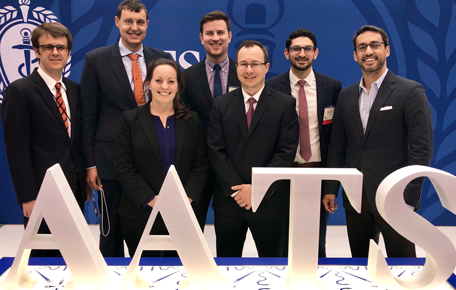 All residents spend at least one month of dedicated and protected research time and most residents spend one to three years in the NIH-funded clinical or basic science research laboratories combining academic excellence with clinical expertise. At UVA, residents will attend weekly and daily conferences as part of their curriculum. It is a culture and an expectation that residents in our program seek opportunities to educate. Many UVA students cite this as a reason to seek entrance to our residency, and the plethora of teaching awards won by our residents stand as evidence to this fact.
All residents spend at least one month of dedicated and protected research time and most residents spend one to three years in the NIH-funded clinical or basic science research laboratories combining academic excellence with clinical expertise. At UVA, residents will attend weekly and daily conferences as part of their curriculum. It is a culture and an expectation that residents in our program seek opportunities to educate. Many UVA students cite this as a reason to seek entrance to our residency, and the plethora of teaching awards won by our residents stand as evidence to this fact.
Resident Education by Year
The General Surgery Program at the University of Virginia offers a unique commitment to the residents through a rigorous clinical experience, dedicated research, and a structured curriculum striving to create future leaders in academic surgery. During the five-years of the clinical program, residents gain knowledge of pre-operative and post-operative patient care with a strong focus on critical care, develop surgical technical skills, and most importantly, acquire pre-, intra-, and post-operative decision-making skills.
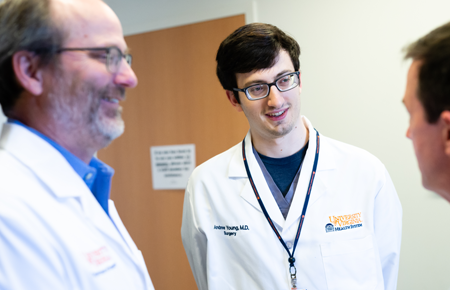 PGY-1
PGY-1
During their intern year, general surgery residents will be exposed to the majority of surgical specialties. They will complete 4-week rotations in the following specialties: Blue surgery (colorectal), Orange surgery (laparoscopy, upper GI, bariatric), Gold surgery (surgical oncology, endocrine), Green surgery (hepatobiliary), plastic surgery, cardiothoracic or vascular surgery, transplant surgery, surgical critical care, surgical nutrition and endoscopy, pediatric surgery, and night float. Most of their time is spent learning pre-operative and post-operative patient management and acquiring basic surgical skills in the operating room or in the surgical skills laboratory. The incoming intern class consists of approximately 17 residents, 5 of whom are in the categorical general surgery program.
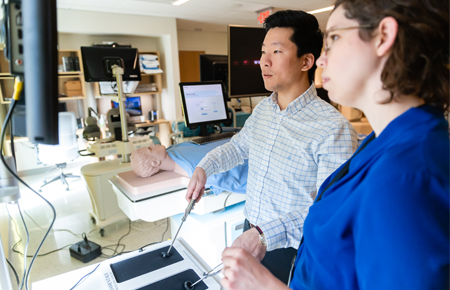 PGY-2
PGY-2
Greater responsibility, autonomy, and a higher level of surgical skills are acquired during the second year. Residents focus extensively on the management of critically ill patients, participate in basic laparoscopic cases, but also learn more advanced techniques for vascular surgery as they rotate through transplant and vascular access service, trauma and cardiovascular/thoracic intensive care unit, endoscopy and vascular surgery. During the second year, residents have the opportunity to care for veterans as they spend several months at the Veterans’ Hospital in Salem, Virginia. Second year residents also start to function as the general surgery consult resident in close coordination with a chief resident.
Following completion of the second year, residents are encouraged to pursue basic science or clinical research.
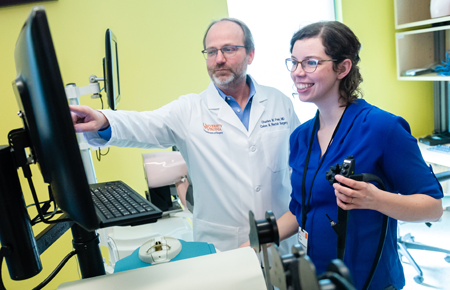 PGY-3
PGY-3
The third year of residency involves in-depth surgical education with a specific focus on patient evaluation and operating. Four to five months of this year are spent on general surgery services, and one to two months are spent on surgical oncology, thoracic surgery, and acute care surgery. In addition, the third-year residents act as the first line surgical consultant.
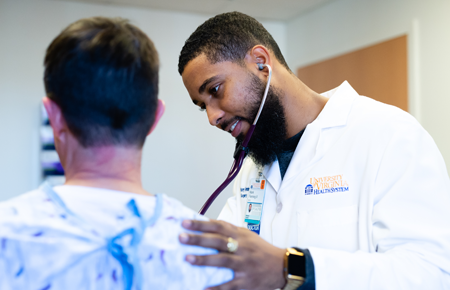 PGY-4
PGY-4
During the fourth year, residents spend much more time functioning as the chief of service. Residents rotate on pediatric surgery, vascular, trauma, and Red (endocrine) surgery. One block is spent at Augusta Medical Center, a busy community hospital, in Fishersville, VA.
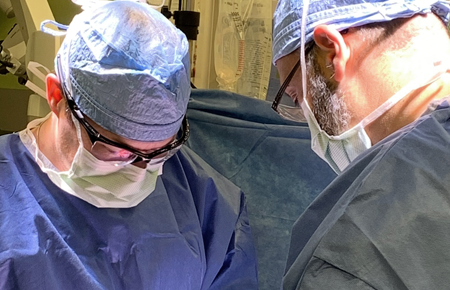 PGY-5
PGY-5
By the fifth year, our residents emerge as skilled surgeons performing complex cases and perfecting their surgical techniques and clinical decision making skills. The chief general surgery rotations include Blue surgery (colorectal), Orange surgery (laparoscopy, upper GI, bariatric), Green surgery (hepatobiliary), Emergency General Surgery, and a rotation at the Salem Veterans Hospital. Chiefs assume greater responsibilities for patient care, education, mentoring, and management of their teams. Chiefs also finalize their plans for fellowship or practice following completion of their general surgery residency training.
Operative Experience
The surgery residents at UVA finish with experience in a multitude of simple and complex cases, more than satisfying the requirements set forth by the American Board of Surgery. The following are the average case totals for the graduated chief class of 2019.
| Defined Categories | RRC Requirements | UVA Average | National Average+ |
|---|---|---|---|
| Skin Soft Tissue/Breast | 25 | 53.4 | 65.0 |
| Head and Neck | 25 | 72.2 | 22.7 |
| Alimentary Tract | 180 | 306.4 | 288.1 |
| Abdominal | 250 | 363.4 | 46.7 |
| Liver | 5 | 24.8 | 9.9 |
| Pancreas | 5 | 15.0 | 10.0 |
| Vascular | 50 | 72.6 | 114.5 |
| Endocrine | 15 | 57.0 | 33.2 |
| Trauma Operative | 10 | 20.8 | 30.1 |
| Trauma non-Operative | 40 | 117.8 | 46.9 |
| Thoracic | 20 | 43.6 | 39.1 |
| Pediatric | 20 | 47.8 | 25.1 |
| Plastic | 10 | 12.8 | 25.6 |
| Surgical Critical Care | 40 | 60.6 | |
| Laparoscopic-basic | 100 | 152.4 | 177.1 |
| Endoscopy | 85 | 128.6 | 137.5 |
| Laparoscopic-complex | 75 | 143.8 | 114.9 |
| Total major | 850 | 1056.4 | |
| Total chief | 200 | 276.8 | |
| Total Teaching Assist | 25 | 39.6 |
Program Summary of Performance on ABS Examinations : 2021 – 2023
- First-Taker Examination Pass Rates (2021-2023 Graduates)
- General Surgery Qualifying and Certifying Examinations (QE & CE)
- Program Examinees Passed QE on 1st Attempt – 100%
- Program Examinees Passed CE on 1st Attempt – 100%
- National Examinees Passed QE on 1stAttempt – 95%
- National Examinees Passed CE on 1stAttempt – 86%
Laparoscopic Skills Laboratory
Fundamental surgical skills including laparoscopy are learned in a skills laboratory located in the Education Resource Center. In addition, residents have the opportunity to travel to national meetings and further improve their laparoscopic techniques.
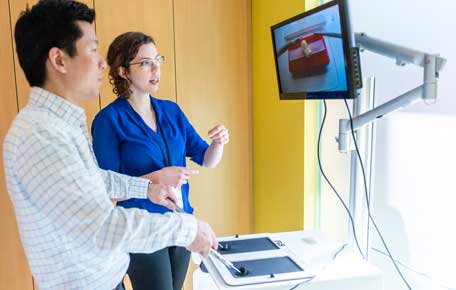
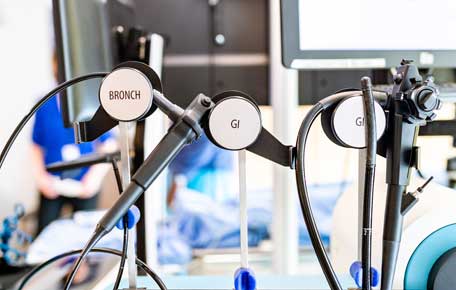
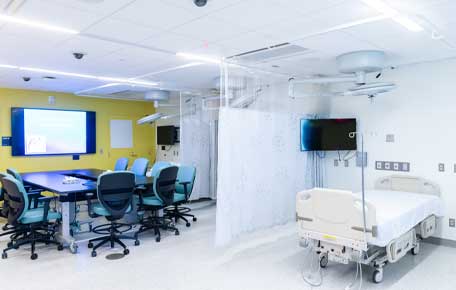
Additional Information
Patient care offers ample opportunities for learning; however, structured surgical training through daily or weekly conferences and readings are an equally important part of UVA’s educational plan.
- The Mortality and Morbidity Conference allows for discussion of all deaths and complications in an open forum on weekly basis.
- The Teaching Conference require residents to read a chapter per week set forth by the two-year American College of Surgeons’ curriculum. They participate in weekly topic discussions and lectures. The chiefs and senior residents are responsible for preparing these conferences and an attending with expertise on the topic mentors each session.
- The Morning Report is a daily conference during which residents sign-out patients and present the most valuable teaching points from the previous 24 hours. A short teaching presentation is given daily during this conference.
- Grand Rounds introduces a variety of pertinent surgical, economic, and social topics to residents in a lecture format. We are grateful to have the opportunity to meet and learn from some of the most accomplished surgeons in the world.
- Mock Orals test residents’ knowledge and prepare our residents for board examinations. PGY4 and PGY5 residents are assessed and trained to pass the oral examinations several times a year.
- A multitude of additional conferences specific to residential rotations are also attended on weekly basis.
At UVA, you work hard, but we also give you time to rest. Interns and PGY-2 residents each get a calendar month of vacation. PGY-3 and above, each get three nine-day vacation blocks. You are granted time away to present at meetings which is separate from your vacation time. In addition, chief residents are granted a week of conference leave where they are not required to present. During the Winter Holiday/New Year period, residents are each given 5 to 6 days off. Similarly, on or around Thanksgiving, each resident is given 2 days off.
We are proud to offer up to $1500.00 to help offset the costs of travel and housing for highly qualified medical students who wish to do a visiting surgical clerkship at our institution during the months of August through October.
The purpose of this scholarship is to provide medical students the opportunity to experience what it is like to live and work in Charlottesville, while experiencing firsthand our department’s welcoming culture. This clerkship experience will hopefully encourage students to consider a career in surgery, enhance students’ awareness of opportunities in academic medicine and provide them with specific mentoring and networking opportunities. Additionally, students will have the opportunity to meet with the Program Director.
Students will rotate for four weeks on one of our core General Surgery rotations such as the colorectal, hepatobiliary, minimally invasive and foregut services. They will be expected to function at the level of a sub-intern or advanced medical student. Students will be expected to actively prepare for and participate in morning rounds, attend daytime operations, work at least two weekends, and give at least one formal presentation during their visit with us. They will also be expected to attend all morning reports, teaching conferences, morbidity and mortality conferences, and Grand Rounds with our residents. Learn more and apply here.
Application Info
Applications to our program are accepted through Electronic Residency Application Service (ERAS AAMC).
